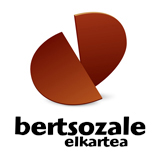Liburutegia - Fitxa ikusi Atal honi buruz
Oral epic traditions in China and beyond
 Liburua:
Ingelesa.
Erreferentzi bibliografikoa
Liburua:
Ingelesa.
Erreferentzi bibliografikoa
- Egilea(k)
- Gejin, Chao
- Izenburua
- Oral epic traditions in China and beyond / By Chao Gejin, Liang Yanjun.
- Argitalpena
- London: Routledge, 2021
- Gaiak
- Foley, John Miles ; Txina
- Beste egileak
Yanjun, Liang - Deskribapen fisikoa
- 272 or.
- Informazio formatua
- Liburua
- ISBN / ISSN
- 9781003258001
This volume is the masterpiece of Chao Gejin, one of the best-known Chinese scholars of Epic studies, representing his most influential works on the change of the nature of the Epic across the twentieth century. The discussion ranges from Homeric and Indo-European epics to renewed discoveries of age-old African and Asian epics. The author details developments in research from Parry and Lord’s work on Serbo-Croat oral poetry to his own research on the Mongol heroic epic. The book traces the formation of theoretical systems such as Oral Formulaic Theory, Ethnopoetics and Performance Theory, and ends with the author’s explorations of the 20th-century Mongolian bard Arimpil’s singing of his native epic poetry. Using methods that previous scholars used to demonstrate the fundamentally oral nature of the Homeric epic, Chao brings to light the poetic richness of the still-living Mongol oral epic tradition. Students and scholars of epic studies, literature, folklore and anthropology will find this an essential reference.
Part I Critical Reflections on Epic Studies.
1. Homer to Arimpil: The Pardigm Shift in International Epic Studies.
2. The History of Epic Research.
3. Current Issues in Epic Research.
4. John Miles Foley and Recent Research Trends on Oral Traditions.
5 Gregory Nagy: From the Homeric Question to Homeric Questions.
6. Lauri Honko: The Identity Function of Epic Poetry.
Part II Theories and Methods of Oral Poetics.
7. Oral Poetics and the Oral Formulaic Theory.
8. Field Investigations of Oral Epic Transmission.
9. Oral Poetics and Chinese Epic Research: Interview with the Author.
10. Types of Oral Epic Texts: A Mongol Case Study.
11. “Back to Voice”: The Study of Oral Epic Texts.
12. “How Long is Long”: Epic Length.
Part III Indigenous Research on Mongolian Oral Poetics.
13. Mongolian Oral Epic Poetry.
14. The Oirat Epic Cycle of Jangar.
15. Analysis of Mongolian Epic Formulae.
16. Analysis of Mongolian Epic Prosody.
Part IV Comparative Study of Four Epic Traditions.
17. Five Issues in the Study of Mongolian, South Slavic, Ancient Greek, Old English Epic
1. Homer to Arimpil: The Pardigm Shift in International Epic Studies.
2. The History of Epic Research.
3. Current Issues in Epic Research.
4. John Miles Foley and Recent Research Trends on Oral Traditions.
5 Gregory Nagy: From the Homeric Question to Homeric Questions.
6. Lauri Honko: The Identity Function of Epic Poetry.
Part II Theories and Methods of Oral Poetics.
7. Oral Poetics and the Oral Formulaic Theory.
8. Field Investigations of Oral Epic Transmission.
9. Oral Poetics and Chinese Epic Research: Interview with the Author.
10. Types of Oral Epic Texts: A Mongol Case Study.
11. “Back to Voice”: The Study of Oral Epic Texts.
12. “How Long is Long”: Epic Length.
Part III Indigenous Research on Mongolian Oral Poetics.
13. Mongolian Oral Epic Poetry.
14. The Oirat Epic Cycle of Jangar.
15. Analysis of Mongolian Epic Formulae.
16. Analysis of Mongolian Epic Prosody.
Part IV Comparative Study of Four Epic Traditions.
17. Five Issues in the Study of Mongolian, South Slavic, Ancient Greek, Old English Epic


